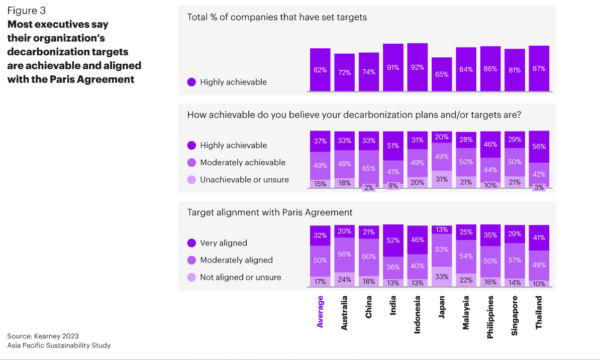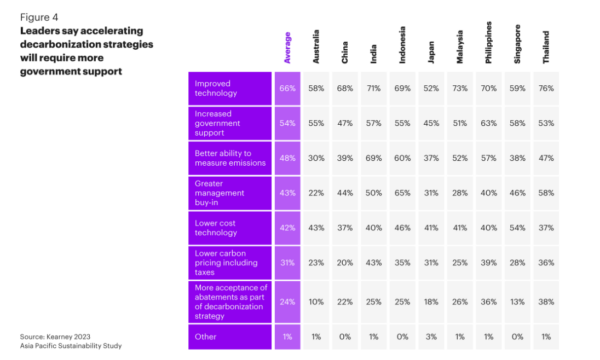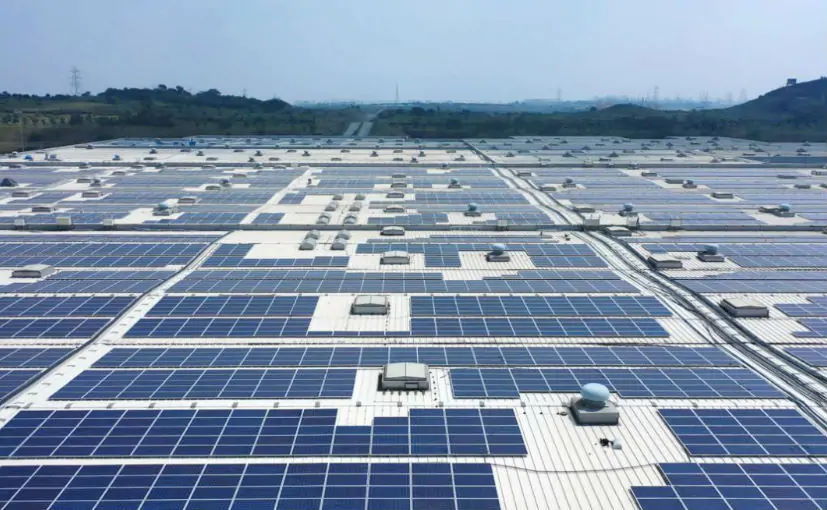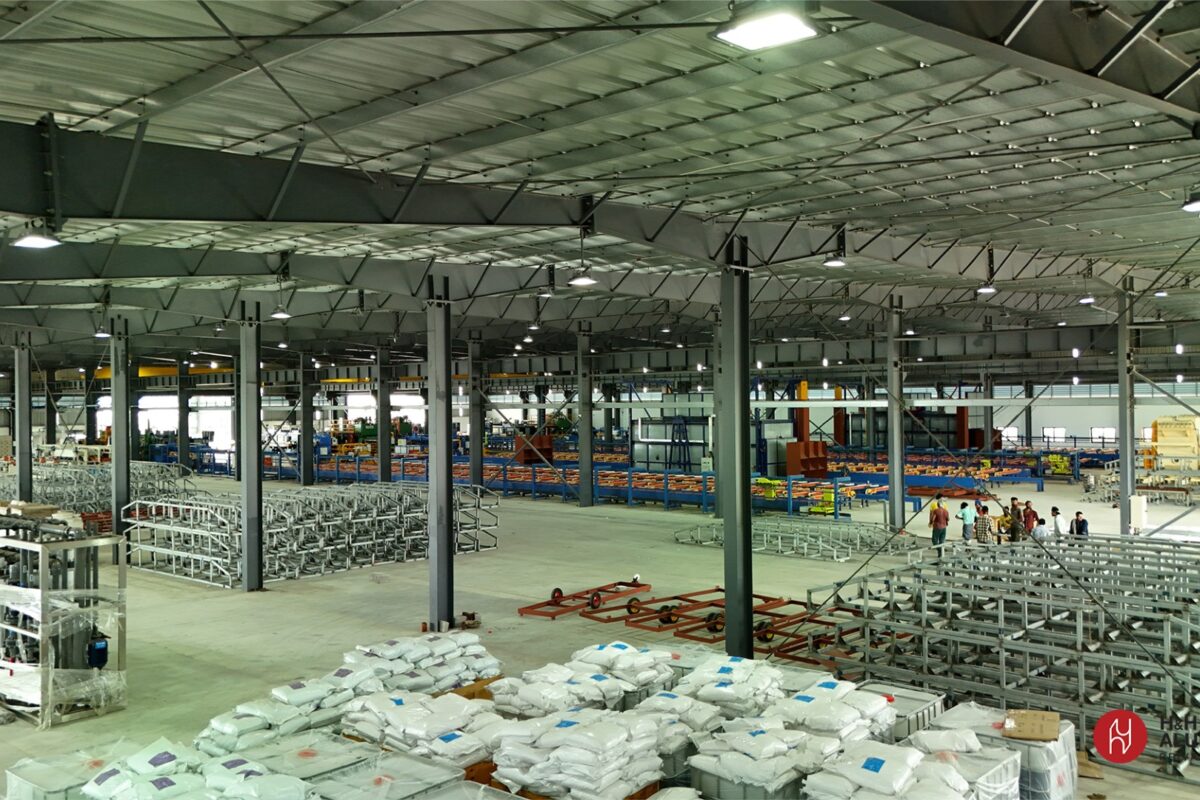A new study by global management consultancy Kearney surveyed nearly 1,000 business leaders across diverse industry sectors in nine Asia Pacific (APAC) countries (India, Australia, China, Indonesia, Japan, Malaysia, the Philippines, Singapore, and Thailand) to capture their views on sustainability initiatives within their organizations, covering target setting, decarbonization pathways, and hurdles impeding progress.
The study, titled “Regenerate: an Asia Pacific study on sustainability and beyond”, states that 91% of the businesses surveyed in India have set targets to reach net zero. More than half (52%) of the businesses surveyed in India have decarbonization plans that are acutely aligned with the Paris Agreement, and the majority of them (92%) believe that the targets are attainable. This report indicates the country’s relatively healthier pace of progress towards global net zero targets than other APAC countries surveyed.

The study revealed that to achieve progress on the sustainability front, Indian companies need to adjust strategies and set achievable timelines.
While Asia-Pacific businesses are optimistic about achieving their decarbonization targets, India is at the forefront of leading the region towards achieving net zero.
The majority of businesses surveyed in India (71%) believe that enhanced technologies would accelerate their decarbonization initiatives. 57% consider support from the government crucial for expediting decarbonization efforts. 68% leaders suggested the need for a better ability to measure emissions.

Arun Unni, partner and APAC Sustainability Co-lead, Kearney, said: “Energy transition is not just a challenge but presents one of the greatest investment opportunities in the coming decades. It is positive to see businesses across the Asia Pacific actively setting targets for achieving net zero. However, these targets need to be aligned with global standards, even if the approach is highly local. If timed right, not only can they harness the full benefits of clean energy technologies and energy-efficient practices, but they can also add significantly to their bottom-lines and valuations.”
Greenwashing fears fuel sustainability investment, but sustainability is still seen as a business cost rather than an opportunity. 78% of companies surveyed in India continue to view sustainability efforts as a cost to business rather than a value-creating opportunity. More than half of the respondent businesses (52%) view sustainability trends as a risk rather than an opportunity. This leads to companies adopting short-term sustainability plans and most having sustainability ambitions influenced by meeting societal expectations and keeping up with competition.
Kate Hart, Partner and APAC Sustainability Co-lead, Kearney, said: “The perception of sustainability as a cost instead of an opportunity is unfortunately a short-term business focus which hinders the full integration of sustainability into operations. Closing this gap requires strong leadership, innovation, and a resilient culture which demands more than just sustainability; it requires embracing regenerative principles.”
Regenerative practices needed
Asia remains especially vulnerable to climate impacts and as growth continues to surge, there is an urgent need for the region to transition towards development that is not only carbon-neutral but also climate-resilient. Regenerative businesses are at the forefront of adopting this transformative approach. 54% of surveyed companies in India perceive themselves as embracing regenerative practices. Notably, among the 54% of companies across India acknowledging the potential for regenerative practices to improve profit and long-term growth, 52% aspires to achieve regenerative practices within the next 1-3 years. By integrating their business systems with broader environmental and social systems, these companies are shifting away from viewing sustainability solely as a risk or cost, and instead, actively aim to contribute positively to the world. This strategic shift prioritizes long-term value creation, advancing sustainable and profitable growth across the region.
Unni said: “In India, where sustainability is an increasing focus, businesses are exploring creative ways to achieve their decarbonization goals. By leveraging clean energy technologies supported by government interventions, Indian businesses are using immediately available greening opportunities to reduce their footprint.”
India ranks fourth in the world for its renewable energy installed capacity, and Improved technology, better ability to measure emissions, and increased government support will fuel momentum in driving investments in energy efficiency, expanding renewable energy generation, as well as the use of green hydrogen for energy storage.”
This content is protected by copyright and may not be reused. If you want to cooperate with us and would like to reuse some of our content, please contact: editors@pv-magazine.com.









By submitting this form you agree to pv magazine using your data for the purposes of publishing your comment.
Your personal data will only be disclosed or otherwise transmitted to third parties for the purposes of spam filtering or if this is necessary for technical maintenance of the website. Any other transfer to third parties will not take place unless this is justified on the basis of applicable data protection regulations or if pv magazine is legally obliged to do so.
You may revoke this consent at any time with effect for the future, in which case your personal data will be deleted immediately. Otherwise, your data will be deleted if pv magazine has processed your request or the purpose of data storage is fulfilled.
Further information on data privacy can be found in our Data Protection Policy.